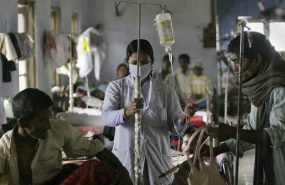Sustainability Bridge Funding: Case Study from Bosnia and Herzegovina, Montenegro and Serbia
In the last decade, an increasing number of donors are withdrawing their support for healthcare. This has been especially true for middle-income countries, where the growth of domestic resources was one of the triggers for donor funding reduction. The Global Fund to Fight AIDS, Tuberculosis and Malaria (the Global Fund) has termed this process as “transition”.
Sustainability Bridge Funding (SBF) is an idea that has been discussed among donors and civil society organizations as a way of mitigating the negative effects of transition and in providing support for key essential services for communities and key populations. As a safety net mechanism, it should respond to gaps in funding and mitigate adverse effects of donor funding withdrawal.
Open Society Foundations (OSF) first piloted the idea of SBF in Southeastern Europe — a region where the withdrawal of Global Fund has led to the collapse of services in countries including Romania, Bosnia and Herzegovina and Serbia — by supporting civil society to navigate the transition process and engage in effective budget advocacy.
Building on this work, in 2018 OSF, through the Eurasian Harm Reduction Association (EHRA), initiated the project, Budget Advocacy and Monitoring in countries of South East Europe . It provided funding to ³ three transitioning countries in the Balkan region – Bosnia and Herzegovina (BiH), Montenegro, and Serbia — through the sub-regional network organization, Drug Policy Network South East Europe (DPNSEE), to support budget advocacy for harm reduction services
“Sustainability Bridge Funding: Case Study from Bosnia and Herzegovina, Montenegro and Serbia” looks at the implementation of this project as one of the demonstrations of the SBF mechanism, with the objectives to:
· Document the SBF pilot in 3 Balkan countries and to analyze the strengths and weaknesses of this approach and to develop suggestions for improvement; and,
· Document the results, successes, and challenges of the budget advocacy projects supported through the SBF approach.
Please find the full version of the Case Study.
Related News
Global Fund Strategy Development – Open Consultation Questions
COVID-19 is radically altering global health, politics and economics, and the impact upon programs fighting HIV, TB and malaria will likely be tremendous. The new pandemic could completely derail our vast efforts of the past 20 years. At the same time, it has galvanized public awareness on global health security in a way that builds […] Read moreGlobal Fund Technical Brief Tuberculosis, Gender and Human Rights
The purpose of this technical brief is: to assist Global Fund applicants to consider how to include programs to remove human rights and gender-related barriers to tuberculosis prevention, diagnosis and treatment services within funding requests, and to help all stakeholders ensure that TB programs promote and protect human rights and gender equality. Post Views: 938 Read moreGlobal Fund Technical brief on HIV and key populations Programming at scale with sex workers, men who have sex with men, transgender people, people who inject drugs, and people in prison and other closed settings
The purpose of this technical brief is to provide information for countries preparing funding requests for comprehensive programs that address the cascade of HIV prevention, diagnosis, treatment, and care for the following key populations: male, female, and transgender sex workers, gay men and other men who have sex with men, transgender people (especially transgender women), […] Read moreServices for migrants and refugees from Ukraine – HIV/TB care with a focus on key populations
Due to the increasing flows of refugees from Ukraine because of Russia’s invasion of Ukraine, the EECA Regional Platform created a spreadsheet to fill contacts details of face-to-face and online services for refugees and migrants (with a focus on HIV/TB care and key population groups).
Regional Platform – EECA
This web-resource is a part of new regional communication and coordination project “Regional Civil Society and Community Support, Coordination and Communication Platform - EECA”, implemented by Eurasian Harm Reduction Association (EHRA).
Tags
See also
-
EECA’s Regional Platform monthly Newsletter #21, February 2026 26.02.2026 11:56
-
EECA’s Regional Platform monthly Newsletter #20, January 2026 27.01.2026 12:58
-
Global Fund Eligibility List 2026 27.01.2026 11:19







